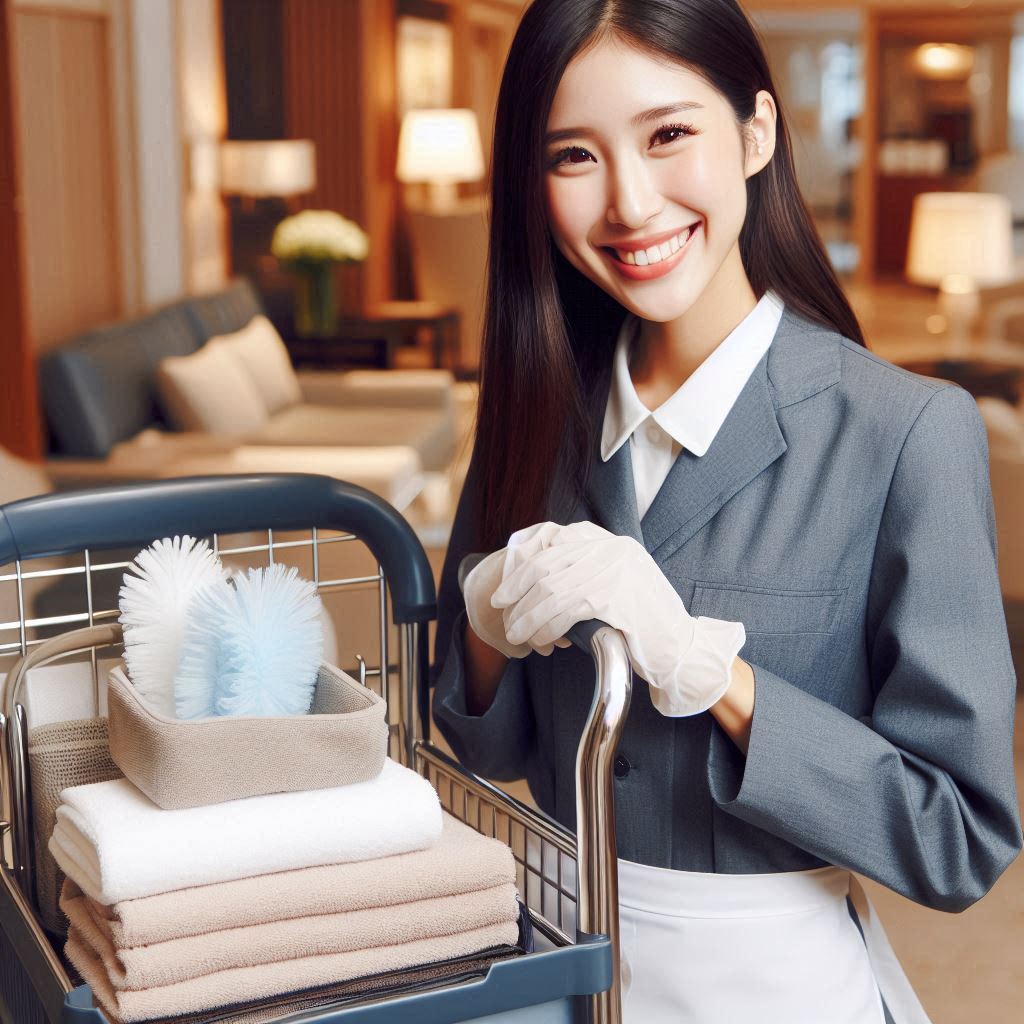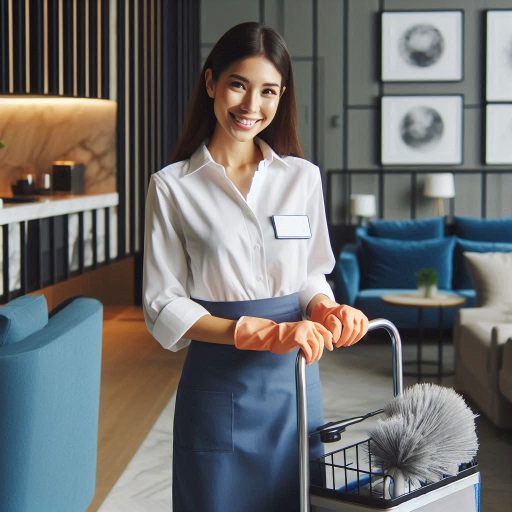Introduction
Maintaining high standards in housekeeping is vital for high-end hotels, as it directly reflects the quality and luxury that guests expect.
Housekeeping is more than just cleaning; it creates an inviting atmosphere that enhances the overall guest experience.
In luxury accommodations, every detail matters, from the spotless floors to the perfectly arranged linens.
A clean and well-organized environment not only ensures comfort but also significantly influences guest perceptions and satisfaction.
When guests enter a room, their first impression is shaped by its cleanliness and attention to detail.
An immaculate room communicates professionalism and care, setting the tone for the entire stay.
Guests naturally associate cleanliness with safety and hygiene, especially in today’s health-conscious environment.
Therefore, any deficiencies in housekeeping can lead to negative reviews and diminish a hotel’s reputation, which is particularly damaging in a competitive market where luxury hotels vie for the same clientele.
In an industry where word-of-mouth and online reviews play a crucial role, maintaining rigorous cleanliness standards is non-negotiable.
Guests are likely to share their experiences on social media and review platforms, and a single negative comment can tarnish a hotel’s image.
Therefore, consistent housekeeping practices are essential not only for maintaining standards but also for protecting the brand’s reputation.
Hiring Process
Importance of Hiring Skilled and Experienced Housekeeping Staff
The hiring process is crucial for maintaining high standards in housekeeping at luxury hotels.
Skilled and experienced housekeeping staff are essential for delivering exceptional guest experiences.
They ensure that every room is pristine and inviting.
Start by defining the specific skills required for housekeeping positions.
Create clear job descriptions that outline essential qualifications.
Look for candidates with experience in upscale or high-end environments.
Prioritize applicants who understand the nuances of luxury hospitality.
The Need for Thorough Background Checks and Training Programs
Conduct thorough background checks during the hiring process.
This step helps identify candidates with a trustworthy history.
It ensures that staff members align with the hotel’s values and commitment to guest security.
A solid background check minimizes the risk of hiring individuals with questionable pasts.
In addition to background checks, implement comprehensive training programs.
Training should cover cleaning techniques, safety protocols, and the use of equipment.
This approach equips staff with the knowledge necessary to perform their duties effectively.
Ongoing training ensures that the team stays updated on the latest industry standards and practices.
The Significance of Good Communication Skills and Attention to Detail in Housekeeping Staff
Good communication skills are vital for housekeeping staff.
Employees must interact effectively with other departments to address guest needs.
Clear communication enhances teamwork and ensures smooth operations throughout the hotel.
Encourage staff to speak openly about any challenges they encounter.
Attention to detail is another key quality to seek in housekeeping staff.
Housekeepers should possess a keen eye for cleanliness and organization.
This attention helps identify areas needing improvement and ensures that no detail is overlooked.
Luxury guests expect immaculate spaces, and detail-oriented staff can deliver that.
When evaluating candidates, conduct practical assessments.
These assessments can test cleaning techniques and organizational skills.
Observing candidates in action provides insight into their abilities.
It also helps identify those who demonstrate initiative and a proactive approach.
In addition to technical skills, assess candidates’ ability to provide excellent guest service.
Housekeeping staff often interact with guests, impacting their overall experience.
Look for individuals who display a friendly demeanor and a willingness to assist.
Lastly, foster a positive work environment to attract and retain skilled employees.
Offer competitive wages and benefits to ensure job satisfaction.
Providing opportunities for advancement can motivate staff to excel in their roles.
A thorough hiring process is essential for high-end hotels.
Prioritizing skilled and experienced housekeeping staff ensures impeccable service.
Thorough background checks, training programs, and communication skills are vital components of successful hiring.
By focusing on these areas, hotels can maintain their reputation for excellence and guest satisfaction.
Read: Steps to Become a Professional Pet Groomer in the USA
Cleaning Procedures
The Need for a Detailed Cleaning Checklist for Each Room
Establishing a detailed cleaning checklist is essential for maintaining high standards in housekeeping.
A checklist ensures that every aspect of a room receives attention during cleaning.
It serves as a guide for housekeepers, promoting consistency and thoroughness.
Each room type should have a tailored checklist that outlines specific tasks.
This includes dusting, vacuuming, changing linens, and sanitizing surfaces.
Regularly review and update the checklist to reflect changing standards and guest expectations.
The checklist also aids in training new staff.
It provides clear instructions on what to clean and how to perform tasks.
By following the checklist, employees can reduce the risk of overlooking important details.
This structured approach enhances accountability among staff members, ensuring they perform their duties effectively.
The Importance of Using High-Quality Cleaning Products
Using high-quality cleaning products is vital for maintaining the pristine appearance of luxury hotel rooms.
Premium products effectively remove dirt, stains, and allergens while protecting surfaces.
These products not only enhance cleanliness but also contribute to the longevity of furniture and fixtures.
Using subpar cleaning agents can damage expensive materials and diminish their appearance over time.
Furthermore, high-quality cleaning products often have superior safety profiles.
They are less likely to cause allergic reactions for guests and staff.
Choosing eco-friendly products also aligns with current trends in sustainability, appealing to environmentally conscious travelers.
Hotels can build a positive reputation by demonstrating their commitment to sustainability.
The Significance of Following Industry Standards and Guidelines for Cleaning High-End Hotels
Following industry standards and guidelines is crucial for high-end hotel cleaning procedures.
Adhering to established protocols ensures that cleaning practices meet health and safety regulations.
This is especially important in the wake of global health concerns, where guests prioritize cleanliness.
Industry standards provide a framework for best practices in housekeeping.
These guidelines often outline procedures for deep cleaning, sanitation, and infection control.
Staying updated on industry developments allows hotels to adjust their practices as needed.
Training staff on these standards enhances their understanding of proper cleaning techniques.
It empowers them to maintain high levels of cleanliness consistently.
Additionally, adherence to industry guidelines helps prevent potential liabilities associated with health violations.
Effective cleaning procedures are essential for high-end hotels.
A detailed cleaning checklist promotes thoroughness and consistency.
Using high-quality cleaning products protects both the hotel’s assets and guests’ health.
Following industry standards ensures compliance and enhances overall service quality.
By focusing on these aspects, hotels can create a clean and welcoming environment for guests, reinforcing their reputation for excellence.
Read: Essential Skills Every Pet Groomer Should Have
Quality Control
The Importance of Regular Inspections and Quality Control Measures
Regular inspections and quality control measures are crucial for maintaining high standards in housekeeping.
These inspections help identify areas that need improvement, ensuring consistent cleanliness and organization.
A systematic approach to quality control allows hotels to uphold their reputation for excellence.
Supervisors should conduct routine inspections of guest rooms and common areas.
They can use detailed checklists to evaluate cleanliness, presentation, and adherence to standards.
These evaluations provide insights into staff performance and highlight training needs.
Regular inspections also motivate staff to maintain high standards, knowing their work will be evaluated.
The Need for Feedback from Guests to Ensure High Standards Are Being Met
Guest feedback is essential for assessing the effectiveness of housekeeping efforts.
Encouraging guests to share their experiences helps identify strengths and weaknesses in service delivery.
This feedback can be collected through surveys, comment cards, or online reviews.
Analyzing guest comments allows hotels to make informed decisions about housekeeping practices.
If guests consistently mention cleanliness issues, it indicates a need for corrective action.
Responding to feedback demonstrates a commitment to guest satisfaction and continuous improvement.
It shows guests that their opinions are valued and taken seriously.
The Benefits of Implementing a System for Tracking and Resolving Issues in Housekeeping
Implementing a system for tracking and resolving issues in housekeeping offers numerous benefits.
Such a system can streamline communication between departments, ensuring that issues are reported and addressed promptly.
Staff can log problems in a centralized database, making it easier to track recurring issues.
This proactive approach enhances accountability among housekeeping staff.
It encourages them to take ownership of their responsibilities and address concerns promptly.
Additionally, tracking issues helps management identify patterns that may require broader changes in procedures or training.
Resolving issues quickly contributes to overall guest satisfaction.
When guests notice that their concerns are addressed efficiently, it builds trust and loyalty.
An effective tracking system fosters a culture of continuous improvement, ultimately enhancing the hotel’s reputation.
Quality control is essential for high-end hotels.
Regular inspections and quality control measures ensure that housekeeping standards are consistently met.
Guest feedback provides valuable insights for improvement, while an effective tracking system streamlines issue resolution.
By focusing on these elements, hotels can maintain exceptional service quality and exceed guest expectations.
Read: How to Handle Emergency Situations in Pet Grooming
Maintenance of Facilities
The Importance of Regular Maintenance of Equipment and Facilities
Regular maintenance of equipment and facilities is essential for high-end hotels to ensure seamless operations.
Well-maintained equipment operates efficiently, reducing the risk of breakdowns that can disrupt service.
This proactive approach saves hotels money by preventing costly repairs and replacements.
Scheduled maintenance checks help identify potential issues before they escalate.
Regular inspections of cleaning equipment, such as vacuum cleaners and floor polishers, ensure they function optimally.
Maintaining common areas, such as lobbies and restrooms, also enhances guest experiences and reflects the hotel’s commitment to quality.
In addition, a well-maintained facility creates a safe environment for both guests and staff.
Regular checks on fire safety equipment, elevators, and HVAC systems prevent hazards that could lead to serious incidents.
The Need for Proper Storage and Handling of Cleaning Supplies
Proper storage and handling of cleaning supplies are crucial for safety and efficiency.
High-quality cleaning products should be stored in designated areas that are secure and well-organized.
This prevents unauthorized access and minimizes the risk of accidents, such as spills or misuse.
Staff should be trained to handle cleaning supplies according to manufacturer guidelines.
This ensures their effectiveness while also prioritizing safety.
Using the right product in the appropriate manner protects guests from potential harm and maintains a healthy environment.
Additionally, maintaining an adequate inventory of cleaning supplies helps avoid last-minute shortages.
Implementing a tracking system allows staff to monitor stock levels and reorder supplies as needed.
This proactive approach ensures that housekeeping operations run smoothly without interruptions.
The Significance of Training Staff on Proper Maintenance Procedures
Training staff on proper maintenance procedures is vital for upholding high standards.
Comprehensive training ensures that employees understand the importance of equipment care and facility upkeep.
This knowledge empowers them to perform routine maintenance checks and report any issues promptly.
Effective training programs should cover proper cleaning techniques, equipment usage, and maintenance schedules.
Staff should learn how to identify signs of wear and tear on equipment.
This proactive approach helps prevent larger problems down the line.
Moreover, fostering a culture of responsibility among staff contributes to overall maintenance efforts.
When employees take ownership of their tasks, they are more likely to follow protocols diligently.
Encouraging teamwork in maintenance tasks enhances efficiency and promotes a sense of pride in the workplace.
The maintenance of facilities is crucial for high-end hotels.
Regular maintenance of equipment and facilities ensures smooth operations and enhances guest satisfaction.
Proper storage and handling of cleaning supplies prioritize safety and efficiency.
Training staff on maintenance procedures cultivates a culture of accountability and care.
By focusing on these aspects, hotels can provide a safe, clean, and welcoming environment for all guests.
Read: How Much Do Pet Groomers Earn in the USA?

Guest Interaction
The Importance of Training Housekeeping Staff on Proper Guest Interaction
Training housekeeping staff on proper guest interaction is vital in high-end hotels.
Housekeepers are often the unsung heroes of the hospitality industry, providing essential services that directly impact guest experiences.
Proper training equips staff with the skills to communicate effectively and professionally with guests.
Housekeeping staff should learn how to greet guests warmly and respond to their needs promptly.
Training programs should include role-playing scenarios to practice various interactions.
This approach helps staff gain confidence and develop a friendly demeanor that enhances guest satisfaction.
Additionally, training should emphasize the importance of active listening.
When staff members listen carefully to guest requests, they demonstrate respect and attentiveness.
This fosters positive relationships and encourages guests to feel valued and cared for.
The Significance of Respecting Guest Privacy and Preferences
Respecting guest privacy and preferences is paramount in high-end hospitality.
Guests often expect discretion, especially in their personal spaces.
Housekeeping staff should be trained to understand and prioritize privacy during their interactions.
To respect privacy, staff should always knock and announce themselves before entering a room.
They should also be aware of guests’ preferences regarding cleaning schedules and room access.
Some guests may prefer not to be disturbed during their stay, and housekeeping should honor these wishes.
Understanding and respecting individual preferences enhances the overall guest experience.
Acknowledging specific requests, such as a preference for a particular cleaning product or time, shows that staff are attentive to guests’ needs.
This attention to detail can significantly impact guest satisfaction and loyalty.
The Benefits of Personalized Service in Housekeeping for High-End Hotels
Personalized service in housekeeping offers numerous benefits for high-end hotels.
When staff take the time to understand guests’ unique preferences, it creates a memorable experience.
Personalized touches, such as leaving a favorite snack or adjusting room temperatures, enhance guest comfort and satisfaction.
Guests are more likely to return to a hotel where they feel recognized and valued.
Personalized service builds strong relationships and fosters loyalty among guests.
In high-end settings, where expectations are high, this level of service sets hotels apart from competitors.
Additionally, personalized service can lead to positive reviews and recommendations.
Satisfied guests are more likely to share their experiences with others, enhancing the hotel’s reputation.
In the digital age, positive online reviews can significantly impact a hotel’s success.
Guest interaction is a critical component of housekeeping in high-end hotels.
Training staff on proper guest interaction enhances communication and professionalism.
Respecting guest privacy and preferences fosters trust and satisfaction.
Personalized service creates memorable experiences that drive loyalty and positive reviews.
By prioritizing these elements, hotels can elevate their guest experiences and maintain their reputation for excellence.
Transform Your Career Today
Unlock a personalized career strategy that drives real results. Get tailored advice and a roadmap designed just for you.
Start NowSustainability Practices
The Importance of Implementing Eco-Friendly Cleaning Practices
Implementing eco-friendly cleaning practices is essential for high-end hotels committed to sustainability.
These practices reduce the environmental impact of hotel operations while promoting a healthier environment for guests and staff.
Using sustainable cleaning methods helps minimize pollution and conserves natural resources.
Eco-friendly practices include using green cleaning techniques, such as microfiber cloths and low-water cleaning methods.
These approaches are effective in maintaining cleanliness while reducing the use of harmful chemicals.
Training housekeeping staff on these practices is crucial to ensure their proper implementation.
Additionally, hotels can adopt energy-efficient cleaning equipment that reduces electricity consumption.
By prioritizing eco-friendly cleaning practices, hotels demonstrate their commitment to sustainability and responsible tourism.
The Benefits of Using Sustainable Cleaning Products and Reducing Waste
Using sustainable cleaning products offers multiple benefits for hotels.
These products are often biodegradable and free from toxic chemicals, ensuring a safer environment for guests.
Choosing eco-friendly products can also enhance indoor air quality, making for a healthier stay.
Reducing waste is another critical aspect of sustainability.
High-end hotels can implement practices such as using refillable cleaning containers, which decrease plastic waste.
Staff should be trained to follow waste reduction protocols, including proper disposal and recycling of materials.
Moreover, using sustainable products and reducing waste can lead to cost savings over time.
While initial investments may be higher, the long-term benefits often outweigh these costs.
By minimizing waste and utilizing sustainable resources, hotels can operate more efficiently and responsibly.
The Impact of Sustainability Practices on Guest Satisfaction and Reputation
Sustainability practices significantly impact guest satisfaction and the hotel’s reputation.
Many travelers today prioritize eco-friendliness when choosing accommodations.
By implementing sustainable practices, hotels appeal to environmentally conscious guests, enhancing their overall experience.
Guests are more likely to feel good about their stay when they know they are supporting a hotel that values sustainability.
This positive perception can lead to increased loyalty and repeat visits.
Additionally, happy guests often share their experiences through word-of-mouth and online reviews, further enhancing the hotel’s reputation.
Moreover, hotels that prioritize sustainability can distinguish themselves from competitors.
By showcasing their commitment to eco-friendly practices, hotels can attract a niche market of sustainability-minded travelers.
This focus can also lead to partnerships with organizations that promote sustainable tourism, further boosting the hotel’s profile.
Sustainability practices are crucial for high-end hotels.
Implementing eco-friendly cleaning practices reduces environmental impact and promotes a healthier atmosphere.
Using sustainable products and reducing waste provides significant benefits, including cost savings.
These practices positively influence guest satisfaction and enhance the hotel’s reputation.
By prioritizing sustainability, hotels can create a positive impact on both their guests and the planet.
Training and Development
The Need for Ongoing Training and Development Programs for Housekeeping Staff
Ongoing training and development programs for housekeeping staff are essential for maintaining high standards in high-end hotels.
These programs ensure that staff are well-equipped with the latest cleaning techniques and safety protocols.
Regular training sessions help reinforce best practices, improving overall efficiency and service quality.
Training should be comprehensive and cover various aspects of housekeeping.
This includes cleaning procedures, equipment usage, and customer service skills.
Ongoing development allows staff to adapt to changes in procedures, technologies, and guest expectations.
Moreover, investing in training fosters a sense of professionalism among staff.
When employees receive continuous education, they feel more confident and competent in their roles.
This confidence translates into better performance and higher levels of guest satisfaction.
The Importance of Staying Updated on Industry Trends and Best Practices
Staying updated on industry trends and best practices is crucial for housekeeping staff.
The hospitality industry is constantly evolving, with new cleaning technologies and sustainable practices emerging regularly.
Keeping staff informed about these trends helps hotels maintain a competitive edge.
Workshops, seminars, and online courses can be valuable resources for staff development.
These learning opportunities expose staff to innovative techniques and products that enhance their skills.
Encouraging staff to participate in industry events also fosters networking and knowledge sharing.
Furthermore, understanding industry trends allows housekeeping staff to anticipate guest needs more effectively.
By being aware of the latest developments, staff can offer tailored services that align with guest preferences.
This proactive approach enhances the overall guest experience.
The Benefits of Investing in the Professional Growth of Housekeeping Staff
Investing in the professional growth of housekeeping staff yields numerous benefits for high-end hotels.
When hotels prioritize employee development, they cultivate a motivated and skilled workforce.
Staff who feel valued and supported are more likely to remain loyal to the organization.
Professional growth opportunities, such as promotions and skill development, contribute to job satisfaction.
Happy employees are more engaged and provide superior service to guests.
This commitment to excellence is crucial in the competitive hospitality industry.
Additionally, investing in staff development enhances the hotel’s reputation.
A well-trained housekeeping team reflects positively on the hotel’s image, leading to increased guest trust and satisfaction.
Guests are more likely to recommend a hotel that demonstrates a commitment to employee training and professionalism.
Ongoing training and development are vital for housekeeping staff in high-end hotels.
These programs ensure that staff are equipped with the latest skills and knowledge.
Staying updated on industry trends enhances service quality and guest satisfaction.
Finally, investing in professional growth fosters employee loyalty and improves the hotel’s overall reputation.
By prioritizing training and development, hotels can maintain their commitment to excellence in service and hospitality.
Conclusion
In high-end hotels, exceptional housekeeping practices are crucial for guest satisfaction and the hotel’s reputation.
Consistent cleanliness and attention to detail create a welcoming environment for guests.
Staff training plays a vital role in maintaining these high standards.
Properly trained staff can anticipate guest needs and exceed their expectations.
Implementing a comprehensive checklist system ensures that no task goes unnoticed.
Regular inspections by supervisors help uphold service quality and encourage accountability among staff.
These inspections can identify areas for improvement and reinforce best practices.
Using eco-friendly cleaning products can enhance the hotel’s image and appeal to environmentally conscious guests.
Sustainable practices resonate with modern travelers and can improve overall guest satisfaction.
Technology can also streamline housekeeping processes and improve efficiency.
Utilizing mobile apps or management systems allows for real-time communication and updates on room status.
High standards in housekeeping contribute to positive guest experiences and encourage repeat visits.
Investing in housekeeping practices not only enhances the overall guest experience but also protects the hotel’s brand reputation.
Hotels that prioritize cleanliness and attention to detail differentiate themselves from competitors.
By maintaining high standards, hotels can secure their reputation and build lasting relationships with guests.
Satisfied guests are more likely to leave positive reviews, recommend the hotel to others, and return for future stays.
Ultimately, impeccable housekeeping is essential for success in the luxury hotel industry.
[E-Books for Sale]
The Big Book of 500 High-Paying Jobs in America: Unlock Your Earning Potential
$19.99 • 500 High-Paying Jobs • 330 pages
Explore 500 high-paying jobs in America and learn how to boost your career, earn more, and achieve success!
See All 500 High-Paying Jobs of this E-Book
1001 Professions Without a Degree: High-Paying American Jobs You Can Start Now
$19.99 • 1001 Professions Without a Degree • 174 pages
Discover 1001 high-paying jobs without a degree! Unlock career tips, skills, and success strategies for just $19.99!




